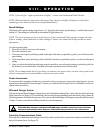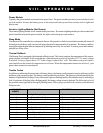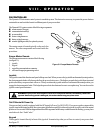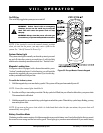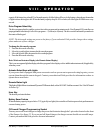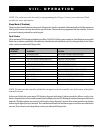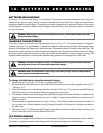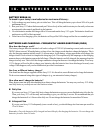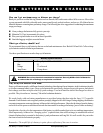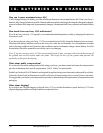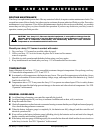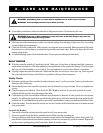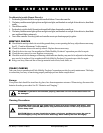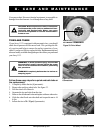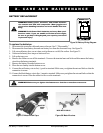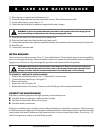
US Jazzy 1113/Rev I/Feb03 www.pridemobility.com 45
IX. BATTERIES AND CHARGING
How can I get maximum range or distance per charge?
Rarely do you have an ideal driving situation such as smooth, flat, hard terrain with no hills or curves. More often
you are presented with hills, sidewalk cracks, uneven and loosely packed surfaces, and curves. All of these factors
affect the distance or running time per battery charge. The following are a few suggestions for obtaining the maximum
range per charge:
n Always charge the batteries fully prior to your trip.
n Maintain 30-35 psi in pneumatic drive tires.
n Plan your trip in advance to avoid inclines if possible.
n Limit the baggage weight to essential items.
What type of battery should I use?
We recommend deep-cycle batteries that are sealed and maintenance free. Both AGM and Gel-Cell are deep-
cycle batteries and are similar in performance.
Use these specifications to reorder deep-cycle batteries.
Battery Specifications
Type: Deep-Cycle AGM or Gel- Cell
Size: U1
Voltage: 12 volts each
Amp Hours: 35 amp hours
WARNING! Corrosive chemicals contained in batteries. Use only AGM or Gel-Cell batteries
to reduce the risk of leakage or explosive conditions.
Why do my new batteries seem weak?
Deep-cycle batteries employ a different chemical technology than that used in car batteries, nickel-cadmium (nicads),
or in other common battery types. Deep-cycle batteries are specifically designed to provide power, drain down
their charge, and then accept a relatively quick recharge. Lead acid batteries should be charged as often as
possible. They do not have a memory like nickel-cadmium batteries.
We work closely with our battery manufacturer to provide a battery that best suits the Jazzy 1113s specific
demands. Fresh batteries arrive regularly and are promptly shipped with a full charge. During shipping, the batteries
encounter temperature extremes that may influence their initial performance. Heat robs the charge from the battery,
and cold slows the power available and extends the time needed to recharge the battery (just as with a car battery).
It might take a few days for the temperature of the battery to stabilize and adjust to its new ambient temperature.
More importantly, it takes a few charging cycles (a partial drain, then a full recharge) to establish the critical
chemical balance that is essential to the batterys peak performance and long life. It is well worth it for you to take
the time to break in the batteries properly.
Remember: The useful life of a battery is quite often a reflection of the care it receives.



